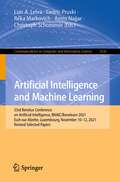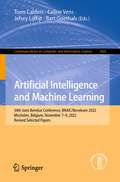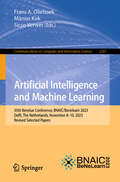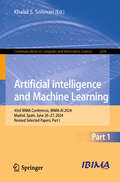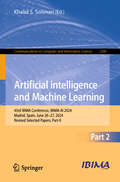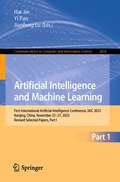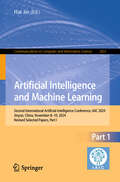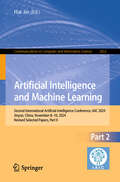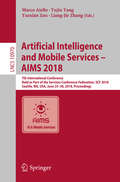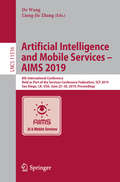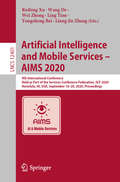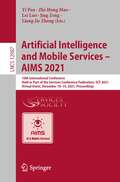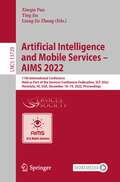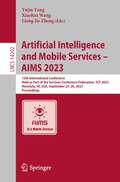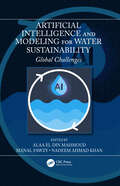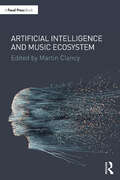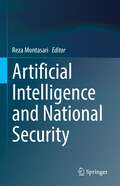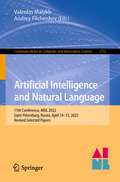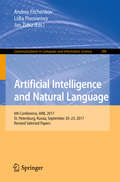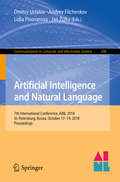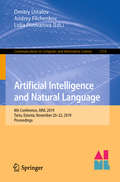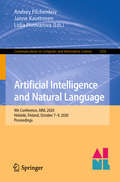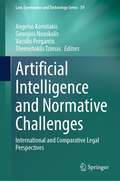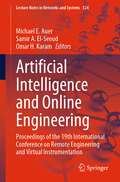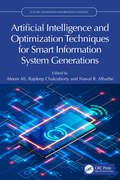- Table View
- List View
Artificial Intelligence and Machine Learning: 33rd Benelux Conference on Artificial Intelligence, BNAIC/Benelearn 2021, Esch-sur-Alzette, Luxembourg, November 10–12, 2021, Revised Selected Papers (Communications in Computer and Information Science #1530)
by Cédric Pruski Amro Najjar Luis A. Leiva Réka Markovich Christoph SchommerThis book contains a selection of the best papers of the 33rd Benelux Conference on Artificial Intelligence, BNAIC/ BENELEARN 2021, held in Esch-sur-Alzette, Luxembourg, in November 2021. The 14 papers presented in this volume were carefully reviewed and selected from 46 regular submissions. They address various aspects of artificial intelligence such as natural language processing, agent technology, game theory, problem solving, machine learning, human-agent interaction, AI and education, and data analysis.
Artificial Intelligence and Machine Learning: 34th Joint Benelux Conference, BNAIC/Benelearn 2022, Mechelen, Belgium, November 7–9, 2022, Revised Selected Papers (Communications in Computer and Information Science #1805)
by Toon Calders Celine Vens Bart Goethals Jefrey LijffijtThis book contains a selection of the best papers of the 34th Benelux Conference on Artificial Intelligence, BNAIC/ BENELEARN 2022, held in Mechelen, Belgium, in November 2022.The 11 papers presented in this volume were carefully reviewed and selected from 134 regular submissions. They address various aspects of artificial intelligence such as natural language processing, agent technology, game theory, problem solving, machine learning, human-agent interaction, AI and education, and data analysis.
Artificial Intelligence and Machine Learning: 35th Benelux Conference, BNAIC/Benelearn 2023, Delft, The Netherlands, November 8–10, 2023, Revised Selected Papers (Communications in Computer and Information Science #2187)
by Frans A. Oliehoek Manon Kok Sicco VerwerThis book constitutes the refereed proceedings of the 35th Benelux Conference on Artificial Intelligence and Machine Learning, BNAIC/Benelearn 2023, held in Delft, The Netherlands, during November 8–10, 2023. The 14 papers included in these proceedings were carefully reviewed and selected from 47 submissions. These papers focus on various aspects of Artificial Intelligence and Machine learning, including Natural Language Processing and Reinforcement Learning, and their applications.
Artificial Intelligence and Machine Learning: 43rd IBIMA Conference, IBIMA-AI 2024, Madrid, Spain, June 26–27, 2024, Revised Selected Papers, Part-I (Communications in Computer and Information Science #2299)
by Khalid S. SolimanThe two-volume proceedings set CCIS 2299 and 2300, constitutes the refereed proceedings of the 43rd IBIMA Conference on Artificial intelligence and Machine Learning, IBIMA-AI 2024, held in Madrid, Spain, in June 26–27, 2024. The 44 full papers and 18 short papers included in this book were carefully reviewed and selected from 119 submissions. They were organized in topical sections as follows: Part I: Artificial Intelligence and Machine Learning; Information Systems and Communications Technologies. Part II: Artificial Intelligence and Machine Learning ; Software Engineering; Computer Security and Privacy.
Artificial Intelligence and Machine Learning: 43rd IBIMA Conference, IBIMA-AI 2024, Madrid, Spain, June 26–27, 2024, Revised Selected Papers, Part-II (Communications in Computer and Information Science #2300)
by Khalid S. SolimanThe two-volume proceedings set CCIS 2299 and 2300, constitutes the refereed proceedings of the 43rd IBIMA Conference on Artificial intelligence and Machine Learning, IBIMA-AI 2024, held in Madrid, Spain, in June 26–27, 2024. The 44 full papers and 18 short papers included in this book were carefully reviewed and selected from 119 submissions. They were organized in topical sections as follows: Part I:Artificial Intelligence and Machine Learning; Information Systems and Communications Technologies. Part II: Artificial Intelligence and Machine Learning ; Software Engineering; Computer Security and Privacy.
Artificial Intelligence and Machine Learning: First International Artificial Intelligence Conference, IAIC 2023, Nanjing, China, November 25–27, 2023, Revised Selected Papers, Part I (Communications in Computer and Information Science #2058)
by Yi Pan Hai Jin Jianfeng LuThis 3-volume set, CCIS 2058-2060 constitutes the First International Conference, on Artificial Intelligence, IAIC 2023, held in Nanjing, China, in November 2023. The 85 full papers presented were carefully reviewed and selected from 428 submissions. The papers are clustered in parts on: Artificial Intelligence and Machine Learning; Data Security and information Security; Computer Networks and IoT. The papers present recent research and developments in artificial intelligence and its applications in machine learning, natural language processing, computer vision, robotics, and ethical considerations.
Artificial Intelligence and Machine Learning: Second International Artificial Intelligence Conference, IAIC 2024, Jinyun, China, November 8–10, 2024, Revised Selected Papers, Part I (Communications in Computer and Information Science #2451)
by Hai JinThis CCIS volume constitutes the refereed proceedings of Second International Artificial Intelligence Conference on Artificial Intelligence and Machine Learning, IAIC 2024, held in Jinyun, China, November 2024. The 38 full papers presented were carefully reviewed and selected from 100 submissions.They were organized in following topical sections as follows: Part I : Artificial Intelligence in Real-World Applications.Part II : Artificial Intelligence in Network and Security systems.
Artificial Intelligence and Machine Learning: Second International Artificial Intelligence Conference, IAIC 2024, Jinyun, China, November 8–10, 2024, Revised Selected Papers, Part II (Communications in Computer and Information Science #2452)
by Hai JinThis CCIS volume constitutes the refereed proceedings of Second International Artificial Intelligence Conference on Artificial Intelligence and Machine Learning, IAIC 2024, held in Jinyun, China, November 2024. The 38 full papers presented were carefully reviewed and selected from 100 submissions.They were organized in following topical sections as follows: Part I : Artificial Intelligence in Real-World Applications.Part II : Artificial Intelligence in Network and Security systems.
Artificial Intelligence and Mobile Services – AIMS 2018: 7th International Conference, Held as Part of the Services Conference Federation, SCF 2018, Seattle, WA, USA, June 25-30, 2018, Proceedings (Lecture Notes in Computer Science #10970)
by Marco Aiello Liang-Jie Zhang Yujiu Yang Yuexian ZouThis book constitutes the proceedings of the International Conference on Artificial Intelligence and Mobile Services, AIMS 2018, held as part of SCF 2018, in Seattle, WA, USA, in June 2018. The 20 papers presented in this volume were carefully reviewed and selected from numerous submissions. The papers cover different aspects of mobile services from business management to computing systems, algorithms and applications. They promote technological technological innovations in research and development of mobile services, including, but not limited to, wireless and sensor networks, mobile and wearable computing, mobile enterprise and eCommerce, ubiquitous collaborative and social services, machine-to-machine and Internet-of-things, clouds, cyber-physical integration, and big data analytics for mobility-enabled services
Artificial Intelligence and Mobile Services – AIMS 2019: 8th International Conference, Held as Part of the Services Conference Federation, SCF 2019, San Diego, CA, USA, June 25–30, 2019, Proceedings (Lecture Notes in Computer Science #11516)
by Liang-Jie Zhang De WangThis book constitutes the proceedings of the 8th International Conference on Artificial Intelligence and Mobile Services, AIMS 2019, held as part of SCF 2019, in San Diego, CA, USA, in June 2019. The 12 full papers and one short paper presented were carefully reviewed and selected from 29 submissions. The papers cover different aspects of mobile services from business management to computing systems, algorithms and applications. They promote technological technological innovations in research and development of mobile services, including, but not limited to, wireless and sensor networks, mobile and wearable computing, mobile enterprise and eCommerce, ubiquitous collaborative and social services, machine-to-machine and Internet-of-things, clouds, cyber-physical integration, and big data analytics for mobility-enabled services.
Artificial Intelligence and Mobile Services – AIMS 2020: 9th International Conference, Held as Part of the Services Conference Federation, SCF 2020, Honolulu, HI, USA, September 18-20, 2020, Proceedings (Lecture Notes in Computer Science #12401)
by Liang-Jie Zhang Ruifeng Xu Wang De Wei Zhong Ling Tian Yongsheng BaiThis book constitutes the proceedings of the 9th International Conference on Artificial Intelligence and Mobile Services, AIMS 2020, held as part of SCF 2020, during September 18-20, 2020. The conference was planned to take place in Honolulu, HI, USA and was changed to a virtual format due to the COVID-19 pandemic. The 11 full and 2 short papers presented were carefully reviewed and selected from 42 submissions. They cover topics in AI Modeling, AI Analysis, AI and Mobile Applications, AI Architecture, AI Management, AI Engineering, Mobile backend as a service (MBaaS), User experience of AI and mobile services.
Artificial Intelligence and Mobile Services – AIMS 2021: 10th International Conference, Held as Part of the Services Conference Federation, SCF 2021, Virtual Event, December 10–14, 2021, Proceedings (Lecture Notes in Computer Science #12987)
by Yi Pan Liang-Jie Zhang Zhi-Hong Mao Jing Zeng Lei LuoThis book constitutes the proceedings of the 10th International Conference on Artificial Intelligence and Mobile Services, AIMS 2021, held as a virtual conference as part of SCF 2021, during December 10-14, 2021.The 9 full presented were carefully reviewed and selected from 20 submissions. They cover topics in AI Modeling, AI Analysis, AI and Mobile Applications, AI Architecture, AI Management, AI Engineering, mobile backend as a service (MBaaS), user experience of AI and mobile services.
Artificial Intelligence and Mobile Services – AIMS 2022: 11th International Conference, Held as Part of the Services Conference Federation, SCF 2022, Honolulu, HI, USA, December 10–14, 2022, Proceedings (Lecture Notes in Computer Science #13729)
by Liang-Jie Zhang Xiuqin Pan Ting JinThis book constitutes the proceedings of the 11th International Conference on Artificial Intelligence and Mobile Services, AIMS 2022, held as Part of the Services Conference Federation, SCF 2022, held in Honolulu, HI, USA, in December 2022. The 10 full papers presented in this volume were carefully reviewed and selected from 22 submissions.The International Conference on AI & Mobile Services (AIMS 2022) aims at providing an international forum that is dedicated to exploring different aspects of AI (from technologies to approaches and algorithms) and mobile services (from business management to computing systems, algorithms, and applications) to promoting technological innovations in research and development of mobile services, including, but not limited to, wireless & sensor networks, mobile & wearable computing, mobile enterprise & eCommerce, ubiquitous collaborative & social services, machine-to-machine & Internet-of-things clouds, cyber-physical integration, and big data analytics for mobility-enabled services.
Artificial Intelligence and Mobile Services – AIMS 2023: 12th International Conference, Held as Part of the Services Conference Federation, SCF 2023, Honolulu, HI, USA, September 23–26, 2023, Proceedings (Lecture Notes in Computer Science #14202)
by Liang-Jie Zhang Yujiu Yang Xiaohui WangThis book constitutes the refereed proceedings of the 12th International Conference on Artificial Intelligence and Mobile Services, AIMS 2023, Held as Part of the Services Conference Federation, SCF 2023, Honolulu, HI, USA, September 23–26, 2023.The 9 full papers presented together and selected from 16 submissions. The conference focuses on AI modeling; AI analysis; AI & mobile applications; AI architecture; AI management; AI engineering; mobile backend as a service (MBaaS); and user experience of AI & mobile services.
Artificial Intelligence and Modeling for Water Sustainability: Global Challenges
by Alaa El Din Mahmoud Manal Fawzy Nadeem Ahmad KhanArtificial intelligence and the use of computational methods to extract information from data are providing adequate tools to monitor and predict water pollutants and water quality issues faster and more accurately. Smart sensors and machine learning models help detect and monitor dispersion and leakage of pollutants before they reach groundwater. With contributions from experts in academia and industries, who give a unified treatment of AI methods and their applications in water science, this book help governments, industries, and homeowners not only address water pollution problems more quickly and efficiently, but also gain better insight into the implementation of more effective remedial measures. FEATURES Provides cutting-edge AI applications in water sector. Highlights the environmental models used by experts in different countries. Discusses various types of models using AI and its tools for achieving sustainable development in water and groundwater. Includes case studies and recent research directions for environmental issues in water sector. Addresses future aspects and innovation in AI field related to watersustainability. This book will appeal to scientists, researchers, and undergraduate and graduate students majoring in environmental or computer science and industry professionals in water science and engineering, environmental management, and governmental sectors. It showcases artificial intelligence applications in detecting environmental issues, with an emphasis on the mitigation and conservation of water and underground resources.
Artificial Intelligence and Music Ecosystem
by Martin ClancyArtificial Intelligence and Music Ecosystem highlights the opportunities and rewards associated with the application of AI in the creative arts. Featuring an array of voices, including interviews with Jacques Attali, Holly Herndon and Scott Cohen, this book offers interdisciplinary approaches to pressing ethical and technical questions associated with AI. Considering the perspectives of developers, students and artists, as well as the wider themes of law, ethics and philosophy, Artificial Intelligence and Music Ecosystem is an essential introduction for anyone interested in the impact of AI on music, including those studying and working in the creative arts.
Artificial Intelligence and National Security
by Reza MontasariThis book analyses the implications of the technical, legal, ethical and privacy challenges as well as challenges for human rights and civil liberties regarding Artificial Intelligence (AI) and National Security. It also offers solutions that can be adopted to mitigate or eradicate these challenges wherever possible.As a general-purpose, dual-use technology, AI can be deployed for both good and evil. The use of AI is increasingly becoming of paramount importance to the government’s mission to keep their nations safe. However, the design, development and use of AI for national security poses a wide range of legal, ethical, moral and privacy challenges. This book explores national security uses for Artificial Intelligence (AI) in Western Democracies and its malicious use. This book also investigates the legal, political, ethical, moral, privacy and human rights implications of the national security uses of AI in the aforementioned democracies. It illustrates how AI for national security purposes could threaten most individual fundamental rights, and how the use of AI in digital policing could undermine user human rights and privacy. In relation to its examination of the adversarial uses of AI, this book discusses how certain countries utilise AI to launch disinformation attacks by automating the creation of false or misleading information to subvert public discourse. With regards to the potential of AI for national security purposes, this book investigates how AI could be utilized in content moderation to counter violent extremism on social media platforms. It also discusses the current practices in using AI in managing Big Data Analytics demands. This book provides a reference point for researchers and advanced-level students studying or working in the fields of Cyber Security, Artificial Intelligence, Social Sciences, Network Security as well as Law and Criminology. Professionals working within these related fields and law enforcement employees will also find this book valuable as a reference.
Artificial Intelligence and Natural Language: 11th Conference, AINL 2022, Saint Petersburg, Russia, April 14–15, 2022, Revised Selected Papers (Communications in Computer and Information Science #1731)
by Andrey Filchenkov Valentin MalykhThis book constitutes the refereed proceedings of the 11th Conference on Artificial Intelligence and Natural Language, AINL 2022, held in St. Petersburg, Russia, in April 2022. The 8 revised full papers and 1 short paper were carefully reviewed and selected from 20 submissions. The volume presents recent research in areas of of text mining, speech technologies, dialogue systems, information retrieval, machine learning, articial intelligence, and robotics.
Artificial Intelligence and Natural Language: 6th Conference, Ainl 2017, St. Petersburg, Russia, September 20-23, 2017, Revised Selected Papers (Communications In Computer And Information Science #789)
by Jan Žižka Andrey Filchenkov Lidia PivovarovaThis book constitutes the refereed proceedings of the 6th Conference on Artificial Intelligence and Natural Language, AINL 2017, held in St. Petersburg, Russia, in September 2017. The 13 revised full papers, 4 revised short papers papers were carefully reviewed and selected from 35 submissions. The papers are organized in topical sections on social interaction analysis, speech processing, information extraction, Web-scale data processing, computation morphology and word embedding, machine learning. The volume also contains 6 papers participating in the Russian paraphrase detection shared task.
Artificial Intelligence and Natural Language: 7th International Conference, AINL 2018, St. Petersburg, Russia, October 17–19, 2018, Proceedings (Communications in Computer and Information Science #930)
by Jan Žižka Andrey Filchenkov Lidia Pivovarova Dmitry UstalovThis book constitutes the refereed proceedings of the 7th Conference on Artificial Intelligence and Natural Language, AINL 2018, held in St. Petersburg, Russia, in October 2018. The 19 revised full papers were carefully reviewed and selected from 56 submissions and cover a wide range of topics, including morphology and word-level semantics, sentence and discourse representations, corpus linguistics, language resources, and social interaction analysis.
Artificial Intelligence and Natural Language: 8th Conference, AINL 2019, Tartu, Estonia, November 20–22, 2019, Proceedings (Communications in Computer and Information Science #1119)
by Andrey Filchenkov Lidia Pivovarova Dmitry UstalovThis book constitutes the refereed proceedings of the 8th Conference on Artificial Intelligence and Natural Language, AINL 2019, held in Tartu, Estonia, in November 2019. The 10 revised full papers and 2 short papers were carefully reviewed and selected from 34 submissions. The papers are organized according to the following topics: data acquisition and annotation; human-computer interaction; statistical natural language processing; neural language models.
Artificial Intelligence and Natural Language: 9th Conference, AINL 2020, Helsinki, Finland, October 7–9, 2020, Proceedings (Communications in Computer and Information Science #1292)
by Andrey Filchenkov Lidia Pivovarova Janne KauttonenThis book constitutes the refereed proceedings of the 9th Conference on Artificial Intelligence and Natural Language, AINL 2020, held in Helsinki, Finland, in October 2020. The 11 revised full papers and 3 short papers were carefully reviewed and selected from 36 submissions. Additionally, the volume presents 1 shared task paper. The volume presents recent research in areas of of text mining, speech technologies, dialogue systems, information retrieval, machine learning, articial intelligence, and robotics.
Artificial Intelligence and Normative Challenges: International and Comparative Legal Perspectives (Law, Governance and Technology Series #59)
by Angelos Kornilakis Georgios Nouskalis Vassilis Pergantis Themistoklis TzimasArtificial intelligence (AI) – both in its current, comparatively limited form and even more so in its potential future forms (such as general and superintelligence) – has raised both concerns and hopes. Its actual and potential consequences are increasingly far-reaching, affecting almost every facet of human life on a collective and individual level: from the use of mobile phones and social media to autonomous weapons, and from the digitalization of knowledge and information to the patentability of AI innovations, unexpected philosophical, ontological, political and legal questions continue to arise.This book offers an insightful and essential guide to the scientific questions that are shaping humanity’s present and future. Presenting a collection of academic essays written by prominent scholars, it addresses the major legal issues concerning AI: its impact on a wide range of human behavior and the general legal response, including questions on AI and legal personhood; responsibility, liability and culpability in the age of AI; the challenges AI poses for intellectual property regimes; human rights challenges; and AI’s impact on jus ad bellum and jus in bello.Given its scope, the book will appeal to researchers, scholars and practitioners seeking a guide to this rapidly transforming landscape.
Artificial Intelligence and Online Engineering: Proceedings of the 19th International Conference on Remote Engineering and Virtual Instrumentation (Lecture Notes in Networks and Systems #524)
by Michael E. Auer Samir A. El-Seoud Omar H. KaramNowadays, online technologies are the core of most fields of engineering and the whole society and are inseparable connected for example with Internet of Things & Industrial Internet of Things (Industry 4.0), Online & Biomedical Engineering, Data Science, Machine Learning, and Artificial Intelligence, Cross & Mixed Reality, and Remote Working Environments. to name only a few. Since the first REV conference in 2004, we tried to focus on the upcoming use of the Internet for engineering tasks and the opportunities as well as challenges around it. Consequently, the motto of this year’s REV2022 was “Artificial Intelligence and Online Engineering”. In a globally connected world, the interest in online collaboration, teleworking, remote services, and other digital working environments is rapidly increasing. In response to that, the general objective of this conference is to contribute and discuss fundamentals, applications, and experiences in the field of Online and Remote Engineering, Virtual Instrumentation and other related new technologies like Cross Reality, Data Science & Big Data, Internet of Things & Industrial Internet of Things, Industry 4.0, Cyber-Security, and M2M & Smart Objects. Another objective of the conference is to discuss guidelines and new concepts for engineering education in higher and vocational education institutions, including emerging technologies in learning, MOOCs & MOOLs, and Open Resources. REV2022 was the 19th in a series of annual events concerning the area of Online Engineering. It has been organized in cooperation with The British University in Egypt (BUE), Cairo, as a hybrid event from February 28 until March 02, 2022.
Artificial Intelligence and Optimization Techniques for Smart Information System Generations (Future Generation Information Systems)
by Rajdeep Chakraborty Aleem Ali Nawaf R. AlharbeThe text comprehensively focusses on the use of artificial intelligence and optimization techniques for creating smart information systems. Focuses on extracting information from blockchain repository using artificial intelligence and machine learning algorithms Presents deep learning models to identify and locate objects within images and videos, making it possible for machines to perform tasks such as self-driving cars, surveillance, and robotics Discusses artificial intelligence and optimization techniques for geographic information system (GIS) generation such as spatial data processing Covers artificial intelligence algorithms such as dimensionality, distance metrics, clustering, error calculation, hill climbing, and linear regression Illustrates topics such as image recognition, natural language processing, fraud detection, information system security, and intrusion detection system
